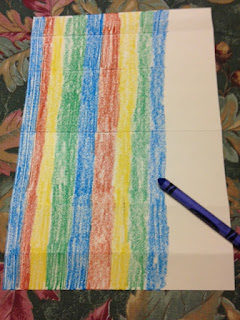VERSES: Acts 19:20-41
MEMORY VERSE: Acts 19:20 "So mightily grew the word of God and prevailed."
BOOK TO REMEMBER: Review the New Testament books from Matthew to Hebrews.
PRAYER: Pray that we have courage like Paul and are able to talk to people about Jesus and the salvation that He offers.
SPECIAL SONG: Jesus Called Them One By One (see June 2015 - Songs We Sing In Bible Class #7 for the words to this song. Click on the orange circle to hear the tune.)
VISUAL AID: Bible map; Activity (see below)
LESSON POINTS:
- Paul had planned to go to Jerusalem and then on to Rome after he had passed through Macedonia and Achaia. Paul sent two men, Erastus and Timothy to Macedonia, but he stayed in Asia for a season.
- About this time, there was a big commotion about the church in Ephesus. There was a certain man named Demetrius who was a silversmilth and made a living making silver shrines to a goddess of the Ephesians named Diana. By making silver shrines or idols and selling them to the people of Ephesus, Demetrius and other silversmiths made a lot of money.
- Demetrius called all the silversmiths together and made a speech to them. He said that Paul was causing trouble in Ephesus. He said to the men who were listening that they and himself made great amounts of money by making idols, but Paul was persuading many people throughout Asia to not worship any idol, but only the God of Heaven. Demetrius said that Paul had told the people that there were no gods made with hands which meant that the silversmiths would be out of jobs if all of the people believed Paul. Demetrius also said that the temple of Diana would be hated by the people and she would not be great anymore.
- When the silversmiths heard what Demetrius said, they were full of rage and cried out, "Great is Diana of the Ephesians!" The city was soon full of confusion. Two men who were traveling with Paul named Gaius and Aristarchus were taken by force into the theater in Ephesus. Paul was going to go into the theater where all the people were, but the disciples pleaded with him not to go. In fact, many of the important people of Asia who were Paul's friends, also told Paul not to go.
- Inside the theater, there was much confusion. Some shouted one thing and others shouted out other things. Most of the people did not even know why they had come together in the theater. The Jews found a man named Alexander and presented him to the crowd, but when the crowd found out that it was Alexander, a Jew, who was to speak, they shouted "Great is Diana of the Ephesians" for two hours!
- Finally, the townclerk quieted the people down and said, "You men of Ephesus, who doesn't know that the city of Ephesus worships the great goddess Diana? You ought to be quiet and do nothing on impulse. These men that you have brought here are not robbers of churches or blasphemers of your goddess. So if Demetrius and his silversmiths have a problem with any man, let them call the deputies. You are in danger of causing this day's confusion and uproar!"
- When the townclerk had spoken to the people, he dismissed the assembly and order returned to the city.
- Sometimes just a few people can cause a great scene where other people are brought into the problem and don't even know what is going on. That is what happened in Ephesus when Demetrius stirred up his silversmiths. We need to be careful that we are never brought unknowingly into the sins of others.
- Demetrius was afraid that Paul was going to convert the whole city to Christ and he would not be able to sell his silver idols. He was worried and anxious. Because of his fear, innocent people could have easily been hurt or killed like Paul's traveling companions, Gaius and Aristarchus.
- Paul was a very brave and courageous person. He was not afraid to enter the theater to talk to the people. He knew he had God on His side!
Materials needed: 9" x 12" yellow construction paper, 2" x 7" piece of aluminum foil, 4" x 8.5" white bond paper, glue, crayons, marker, scissors.
- Hand out yellow paper.
- Draw Demetrius on right side of yellow paper and five or six silversmiths on the left side of the paper.
- Write "Demetrius" above Demetrius' head.
- Write "Silversmiths" above silversmiths' heads.
- Hand out foil.
- Glue foil to right side of Demetrius.
- Write "Diana of the Ephesians" with marker on the foil.
- Color picture.
- Write "Demetrius And Idolatry" and "Acts 19:20-41" at top of the yellow paper.
- Hand out white paper.
- Cut white paper into three speech bubbles.
- On speech bubbles, write "Paul says there are no gods made with hands", "Our craft is in danger," and "Diana will be hated."
- Glue speech bubbles on yellow paper.























